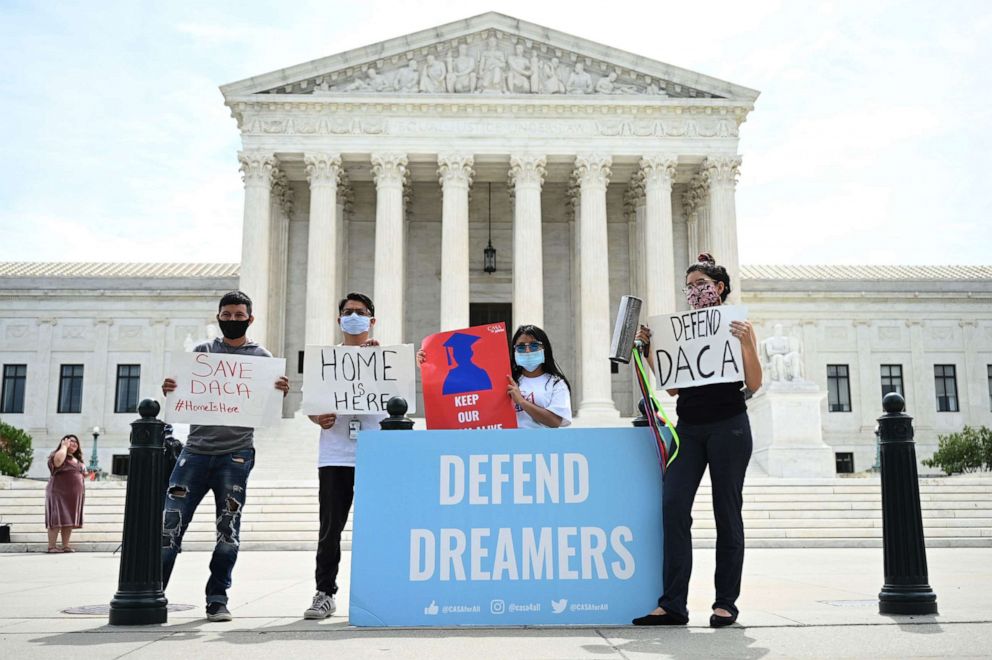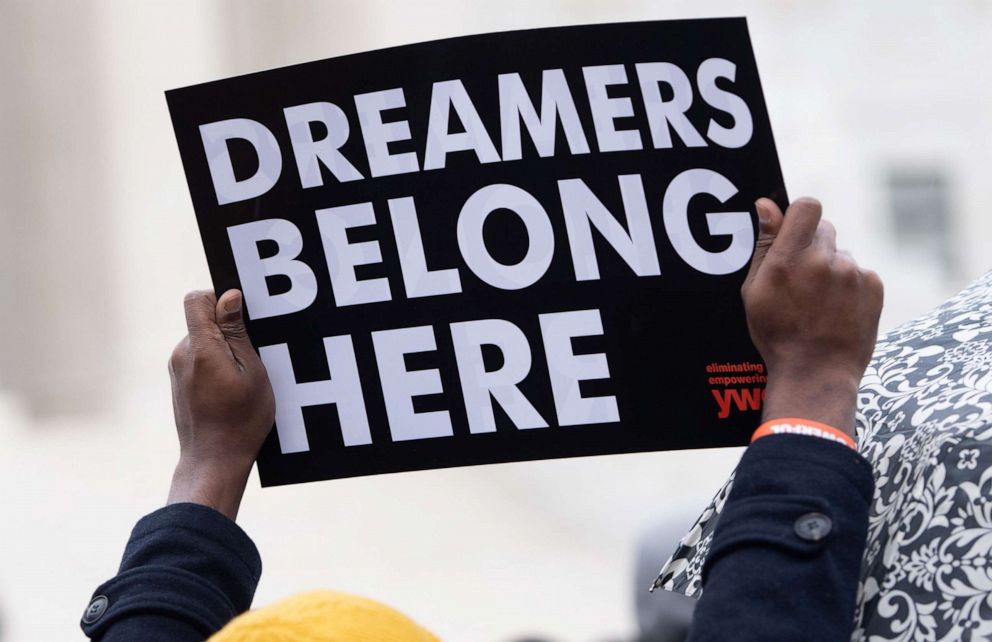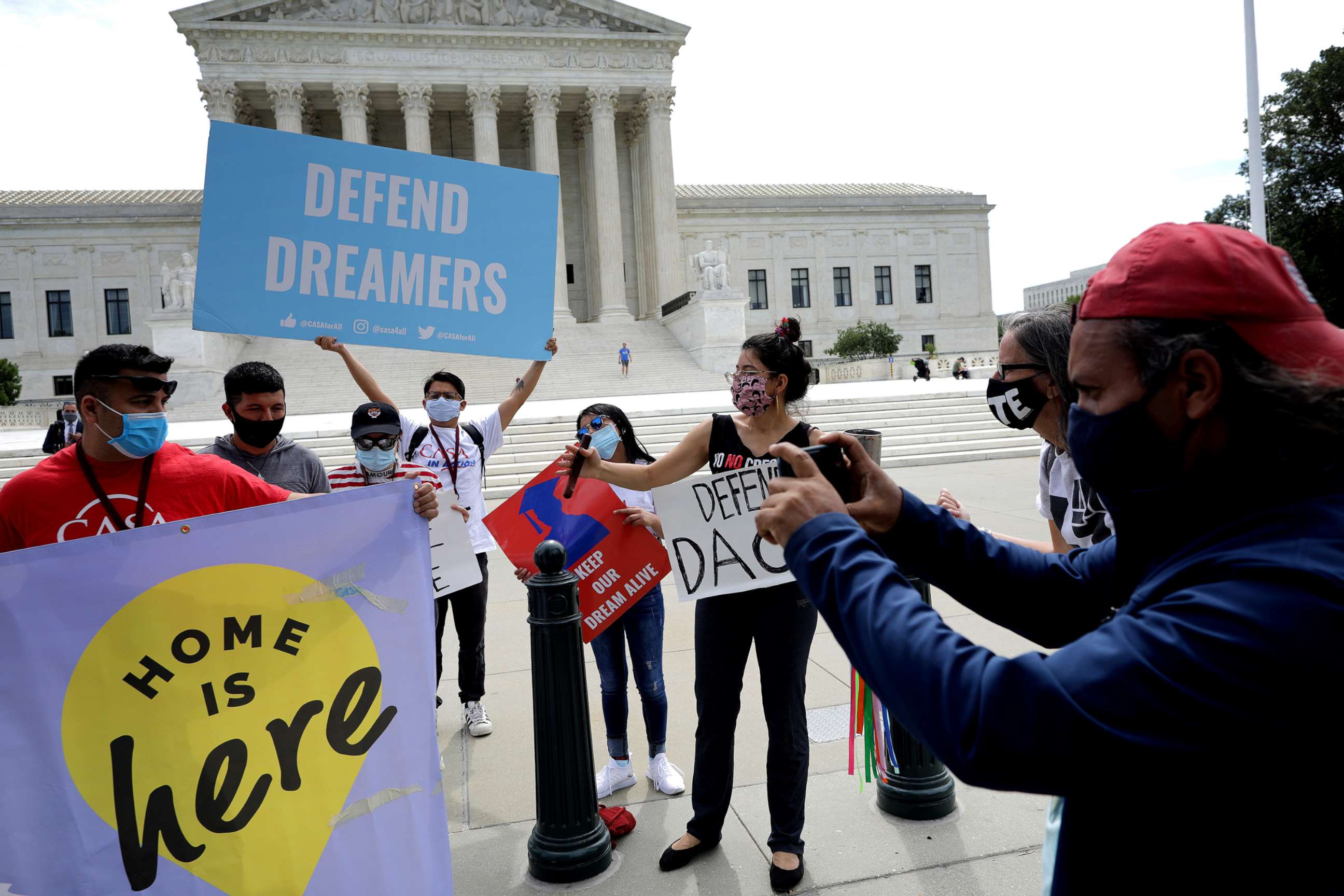What you need to know about DACA
A president likely has the power to end the immigration program.
The Trump administration announced earlier this week it will begin a new formal review of the Deferred Action for Childhood Arrivals program, or DACA, during which it will limit the renewal of deportation protections to one-year periods and continue to reject first-time applications.
The announcement comes less than two months after the Supreme Court ruled that the administration's previous reasoning for ending the program was in violation of federal law. The administration's original justification for moving to end the program in 2017 is part of the review, according to a senior administration official.
Amid the back and forth, ABC News breaks down where DACA currently stands.
What is DACA?

DACA allows young people who were brought to the U.S. illegally as children under the age of 16 to stay in the country and work without being deported.
As of March 31, 640,000 people had active DACA status, and since 2012, more than 825,000 people have utilized the program.
DACA began under President Barack Obama in 2012.
"This morning, Secretary [of Homeland Security Janet] Napolitano announced new actions my administration will take to mend our nation's immigration policy, to make it more fair, more efficient, and more just -- specifically for certain young people sometimes called 'Dreamers,'" Obama said during a speech from the Rose Garden on June 15, 2012. "These are young people who study in our schools, they play in our neighborhoods, they're friends with our kids, they pledge allegiance to our flag. They are Americans in their heart, in their minds, in every single way but one: on paper."
"That's what gave rise to the DREAM Act," he added. "It says that if your parents brought you here as a child, if you've been here for five years and you're willing to go to college or serve in our military, you can one day earn your citizenship."
In 2017, then-Attorney General Jeff Sessions sent a letter to then-acting Secretary of Homeland Security Elaine Duke saying the administration should rescind DACA. The next day, Duke released a memorandum saying the "DACA program should be terminated," citing Sessions' wishes and a lawsuit in a lower court having to do with Deferred Action for Parents of Americans.
A president likely has the power to end DACA
Since Trump announced in 2017 his administration would end DACA, what the federal government can and cannot do regarding changes to DACA has been debated in court.
The Supreme Court ruled in June that President Donald Trump's rationale for canceling the DACA program was "arbitrary and capricious" and was in violation of federal law.
"We do not decide whether DACA or its rescission are sound policies," Chief Justice John Roberts wrote. "We address only whether the agency complied with the procedural requirement that it provide a reasoned explanation for its action. Here the agency failed."
The plaintiffs had argued that the administration violated the Administrative Procedure Act and that it also infringed the equal protection guarantee of the Fifth Amendment’s Due Process Clause.
But Roberts made it clear that a president has the power to end DACA, however, he must do so in a lawful, non-arbitrary and non-capricious way.
This ruling left the door open for the Trump administration to make another attempt at canceling the program.
Trump administration is considering ending DACA -- again
Acting Secretary of the Department of Homeland Security Chad Wolf set the stage on Tuesday to present new arguments that may eventually end DACA once and for all. Wolf released a statement announcing DHS is rescinding the 2017 and 2018 memorandums, which announced the end of DACA and were rejected by the Supreme Court, and will be making immediate changes to DACA policies.
Some of those immediate changes mean DHS will not be accepting any new DACA applications from immigrants who haven't applied before, and that DHS will limit DACA renewals to one year, instead of the usual two.

Wolf's most recent announcement came after a federal judge in a district court in Maryland ruled earlier this month that the Trump administration should restore the program and resume accepting applications.
But a senior administration official said, with the release of the new DHS memo, the judge's ruling to resume accepting applications no longer applies: "Under the judge's order, absent any intervening action from this administration, we would be back to a pre-2017 context, this memo is an intervening action that lays out how the administration will proceed."
Between the SCOTUS ruling and the DHS memo, Department of Justice lawyers told a judge DACA applications are being "held," neither granted nor denied.
But in the DHS memo, Wolf directly addressed the fact that the administration may rescind DACA: "Shortening renewal periods granted during this reconsideration period will have the potential benefit of significantly lessening the lasting effects of the DACA policy if I ultimately decide to rescind it."
What are pro-DACA people saying?
Former United States Citizenship and Immigration Services director under President Barack Obama, León Rodríguez, said the current administration is disregarding the rule of law.
"The administration's actions amount to a complete disregard of the rule of law," Rodríguez said. "The decision to not accept first-time DACA applications and to shorten the period of DACA renewals completely disregards the findings of the district court in Maryland, and is contrary to the spirit of the Supreme Court's decision in its DACA case."

"The administration would be better off exercising leadership to finally find a legislative solution for the plight of the Dreamers," Rodríguez added.
FWD.us, a bipartisan pro-DACA organization, responded to the administration's actions, calling them "anti-immigrant."
"Today's action is as absurd as it is offensive to hundreds of thousands of Dreamers like us who have grown up in the United States since childhood, and to our families and communities," the FWD.us statement said. "In addition to cutting the DACA program's length in half, the new memo excludes hundreds of thousands of new DACA applicants who, like us, deserve to be shielded from deportation in the only country they know as home. Denying these Dreamers the opportunity to continue their lives here is cruel and chaotic. Make no mistake that this two-step dismantling of the DACA program will lay the groundwork for deporting Dreamers like us if Trump is reelected."
What comes next?
Since the Supreme Court won't return until October and Election Day is just one month later, it is unlikely that the highest court in the land will rule on this issue before Americans turn out to vote. If former Vice President Joe Biden wins the presidential election, DACA will likely return to what it once was during Obama's years. Biden supports DACA and other undocumented immigrants the chance to obtain citizenship.
"After failing at the Supreme Court, the Trump Administration took another cruel step in its misguided crusade to repeal DACA," Biden said in a statement this week. "President Trump will stop at nothing to push his anti-immigrant political agenda, even at the expense of young people who have grown up in this country and are Americans through and through."
"As President, I will protect Dreamers and their families and offer a roadmap to citizenship for Dreamers and all 11 million undocumented immigrants enriching our country, so they no longer have to live in fear and uncertainty," he added. "In a Biden Administration, Dreamers can make plans to prosper and thrive here in America -- right where they belong."
If Trump wins reelection, the fate of DACA will continue down a precarious path, likely resulting in its termination.
ABC News' Victoria Moll Ramirez, Devin Dwyer and Quinn Owen contributed to this report.




